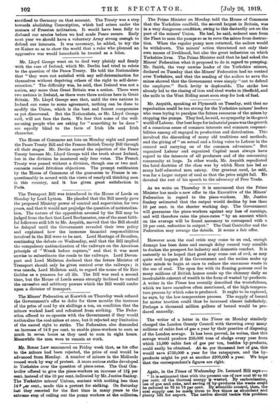The Transport Bill was introduced in the House of Lords
on Monday by Lord Lytton. He pleaded that the Bill merely gave the proposed Ministry power of control and supervision for two years, and that it would not prejudge the question of nationaliza- tion. The nature of the opposition aroused by the Bill may be judged from the fact that Lord Buckmaster, one of the most faith- ful followers still left to Mr. Asquith, moved that the Bill should be delayed until the Government revealed their true policy and explained how the immense financial responsibilities involved in the Bill were to be met. Lord Montagu of Beaulieu, continuing the debate on Wednesday, said that the Bill implied the compulsory nationalization of the railways on the American principle of "Wreck before capture," and that it was most unwise to subordinate the roads to tho railways. Lord Devon- port and Lord Midleton declared that the future Minister of Transport should only be given control over the railways ; it was unsafe, Lord Midleton said, to regard the name of Sir Eric Geddes as a panacea for all ills. The Bill was read a second time, but the House of Lords seems strongly inclined to curtail the excessive and arbitrary powers which the Bill would confer upon a dictator of transport.


































 Previous page
Previous page